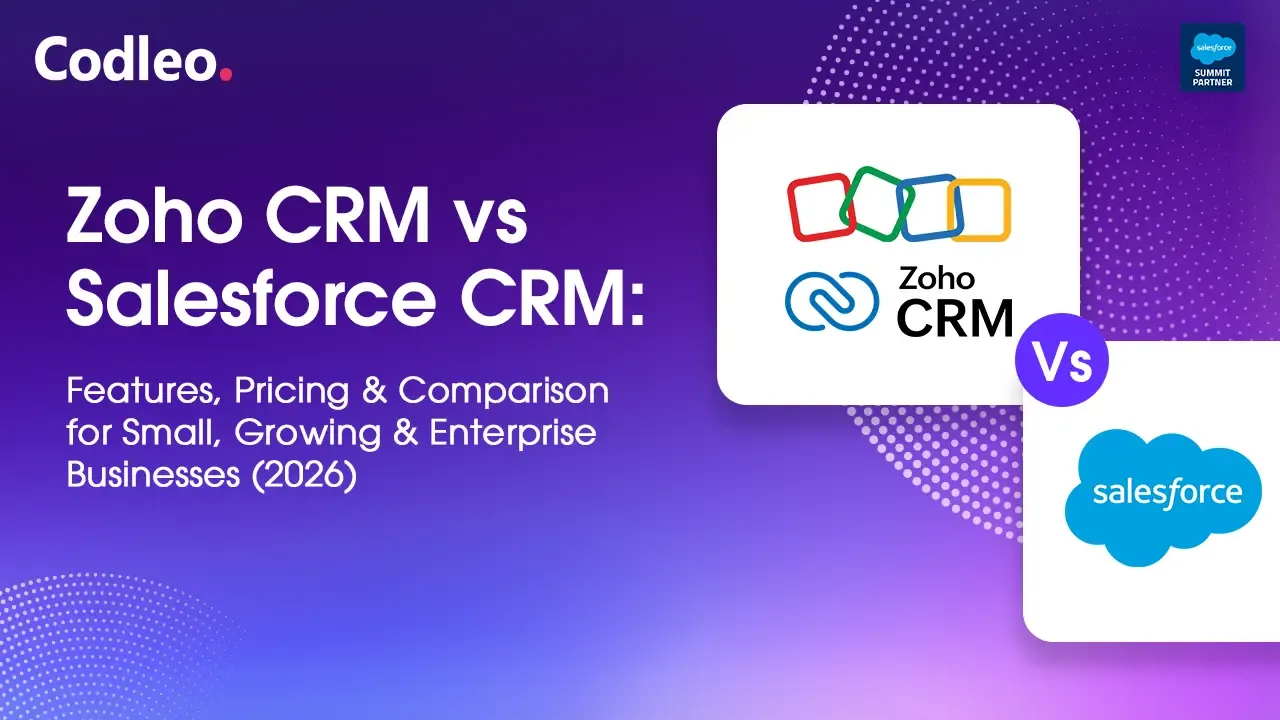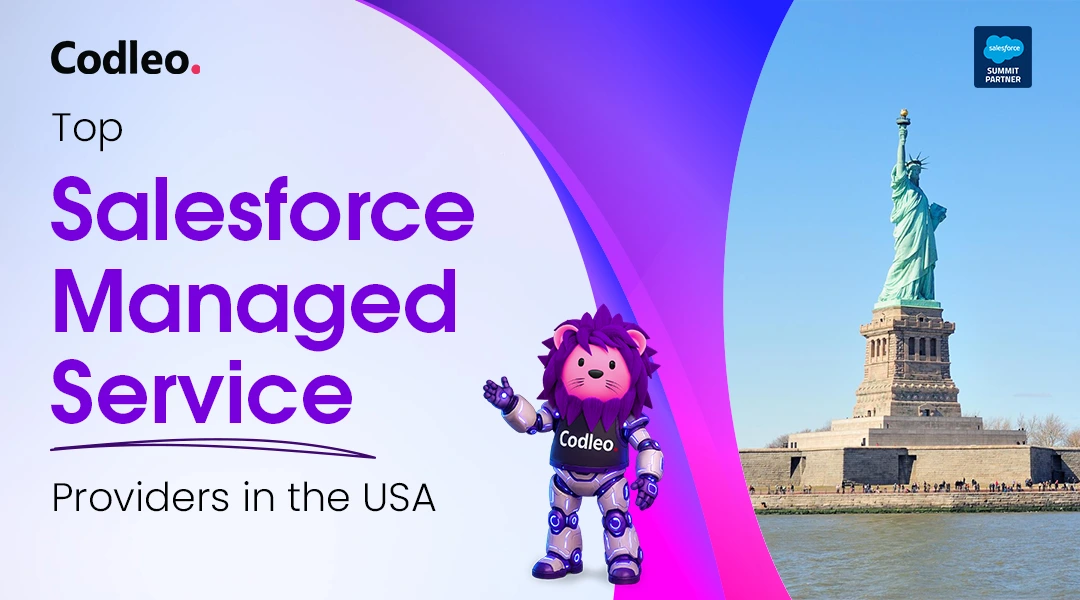Publish date:
In today’s fast-changing digital world, businesses depend on Customer Relationship Management (CRM) systems to improve their operations, enhance customer experiences, and promote growth. Salesforce is a leading CRM solution that helps achieve these goals, but to get the most out of it, you often need to integrate it smoothly with other systems and applications. It is where a Salesforce integration partner comes in.
Choosing the right Salesforce integration partner is crucial because it affects the effectiveness of your CRM. Make sure to consider this when making your decision.
In today's connected world, Salesforce is key to customer success, data-driven sales, and digital transformation. However, if it doesn’t work well with your other tools, it can hurt your clients, lower your revenue, and reduce your team’s productivity. Whether you are a growing startup in London or a large company in Germany, integrating Salesforce is more than just linking tools—it’s about building a united system that helps your business grow. If you face issues such as messy data, slow workflows, or disconnected customer experiences, the problem may not lie with Salesforce itself. The real issue could be a lack of a knowledgeable Salesforce partner who can help optimize your CRM for your business.
Codleo is a top Salesforce consulting company and a certified Salesforce partner. We help businesses in the UK, Germany, and the USA simplify their CRM systems and maximize their return on investment. You can find us highly rated on Clutch and TrustPilot, and we are listed on Crunchbase. We offer a free Salesforce health check with CPQ to help you find gaps in your system before they affect your profits.
Why You Need a Salesforce Integration Partner
Salesforce can connect to various systems, including ERP systems, marketing tools, eCommerce platforms, financial software, and data warehouses. To achieve a smooth, secure integration, you need strong technical skills, a clear plan, and industry knowledge.
An experienced integration partner can:
- Look at your current systems and business goals.
- Choose the best approach for integration (e.g., APIs, middleware, or ETL).
- Set up the integration safely and efficiently.
- Ensure your data remains consistent and your systems operate reliably.
- Provide support and training after the integration is complete.
Key Factors to Consider When Choosing a Salesforce Integration Partner
1. Salesforce Certifications and Expertise
When looking for Salesforce partners, choose those with certified Salesforce developers, architects, and consultants who offer Salesforce integration services. Certifications such as Salesforce Service Cloud Consultant and Platform Developer II demonstrate strong technical skills.
For example, suppose a financial services company needs to stream stock market data into Salesforce dashboards in real time. In that case, they should find a partner with certified Integration Architecture Designers and Platform Developers to avoid hitting governor limits or API caps.
2. Relevant Industry Experience
Your business processes and compliance needs are often unique to your industry. A partner who knows your industry well — such as financial services, healthcare, or retail — will better understand your specific challenges and requirements.
-
For example, suppose a healthcare organization needs to send patient feedback forms from a mobile app to Salesforce while remaining HIPAA-compliant. In that case, they should hire a Salesforce consulting partner who understands how to protect patient information. It includes the following data encryption protocols and logging policies that prevent the capture of sensitive patient data.
You can learn about a partner's expertise by asking for success stories that demonstrate their in-depth knowledge of your industry. Generic solutions won't meet the needs of regulated industries. Having industry expertise helps prevent costly compliance issues.
3. Integration Approach and Tools
Find out what tools and techniques your Salesforce partner uses. Do they favor custom API development, Dell Boomi, Zapier, or MuleSoft? Their strategy ought to align with your technological requirements and expansion objectives. For instance, a rapidly expanding e-commerce company may need to transfer thousands of Shopify orders to Salesforce in a timely manner. For rapid scaling, they should pick a partner who can suggest an API-first solution or a basic ETL tool like Dell Boomi. The tools you choose should not only suit your partner's tastes, but also the stage, complexity, and budget of your company.
4. Portfolio and Case Studies
A good Salesforce integration partner should have a proven history of successful integrations. Request case studies, client references, or success stories that relate to your business situation.
5. Security and Compliance
Data privacy and compliance are paramount when combining systems, such as GDPR, HIPAA, and CCPA. Make sure your partner follows best practices for encryption, access control, and regulatory compliance. For example, a commercial bank might need to connect Salesforce with its core banking system. It will help relationship managers get a full view of client portfolios while also complying with strict rules such as PCI-DSS and SOC 2.
They must choose a partner who:
- Implements field-level encryption for sensitive financial data (like account numbers and transaction histories)
- Design robust audit trails and role-based access controls so only authorized users can see specific data
- Can document compliance alignment with industry standards like FINRA, GDPR, and SOX
Even a small data leak or exposure can lead to hefty fines, loss of trust, or regulatory scrutiny. A knowledgeable partner makes sure all integrations are secure from start to finish.
6. Post-Implementation Support
Integration is an ongoing process, not a one-time task. Continuous support, troubleshooting, and updates are essential for long-term success. It’s important to choose a partner that provides dependable support and service level agreements (SLAs). For example, suppose a logistics company needs to ensure its shipment-tracking data syncs with Salesforce 24/7 across different regions. In that case, it should work with a partner that offers round-the-clock support, clear SLAs, proactive monitoring, and automatic error-fixing scripts.
7. Scalability and Flexibility
Your integration needs may grow over time. Choose a partner who can build a scalable, adaptable solution that can accommodate future systems or changing business processes. For example, a manufacturing company might need to connect Salesforce with its ERP system and supplier portal to support predictive maintenance and automate orders. As the company expands globally, it will face greater integration, more data sources, and additional regional compliance requirements. They need a partner who can design integrations to support multiple factories and suppliers. A future-proof integration strategy ensures good performance, compliance, and the ability to adapt as operations become more complex.
Red Flags to Watch For
- Few or no certified Salesforce professionals on the team
- No clear project plan or timeline
- Unclear integration strategy
- Poor communication or slow responses
- Little or no support after launch
Questions to Ask a Potential Integration Partner
- Can you explain your Salesforce integration process step by step?
- What industries have you worked in?
- How do you ensure data security and compliance during integration?
- What tools or platforms do you use for integrations?
- How do you manage support and monitoring after integration?
What Happens If You Don’t Work with a Salesforce Integration Partner?
Skipping a certified integration partner might save costs initially, but the risks are steep:
Data Silos and Fragmentation
- Multiple systems don’t talk to each other
- Inconsistent customer records
- Inaccurate sales reports
Compliance and Security Issues
- Risk of non-compliance (GDPR, HIPAA)
- No audit trails or encryption
- Data breaches can destroy client trust
Integration Failures and Downtime
- Systems crash or fail to update
- Productivity slows down
- Missed SLAs hurt client relationships
Unexpected Costs
- Fixing failed integrations
- Third-party licensing fees
- Cost of internal IT burnout
Scalability Issues
- Your CRM can’t grow with your business
- Rigid architecture limits innovation
Final Thoughts
Salesforce integration services can make your business more efficient, help you make better decisions based on data, and create personalized customer experiences—but this is only true when done correctly. A good Salesforce integration partner does more than just set up technology; they align it with your business goals, support your teams, and prepare your business for the future.
Carefully evaluate potential partners and choose one that has both technical skills and a strong team-oriented approach.
At Codleo, we bring years of experience as a trusted Salesforce partner, helping businesses like yours streamline operations with seamless, secure, and scalable integrations. Whether you're just starting or looking to optimize an existing setup, our team is here to guide you every step of the way.
👉 Schedule your free consultation today, and let’s find the best integration strategy for your business success.















